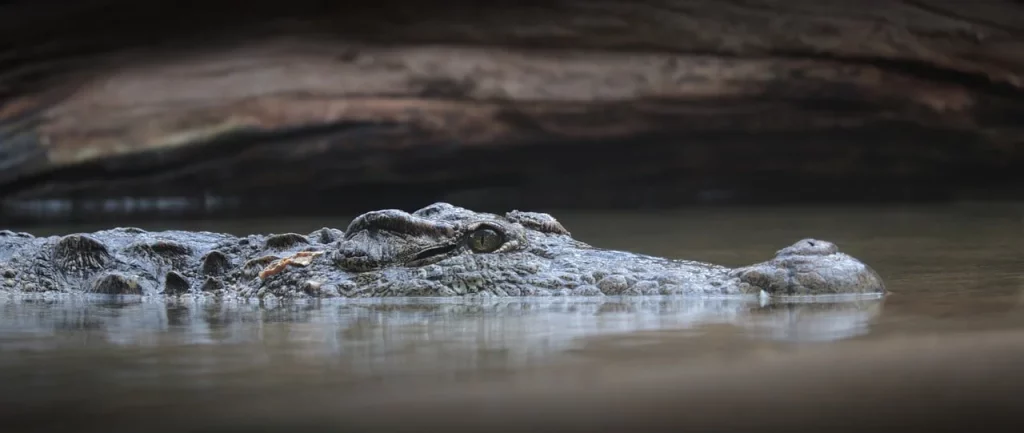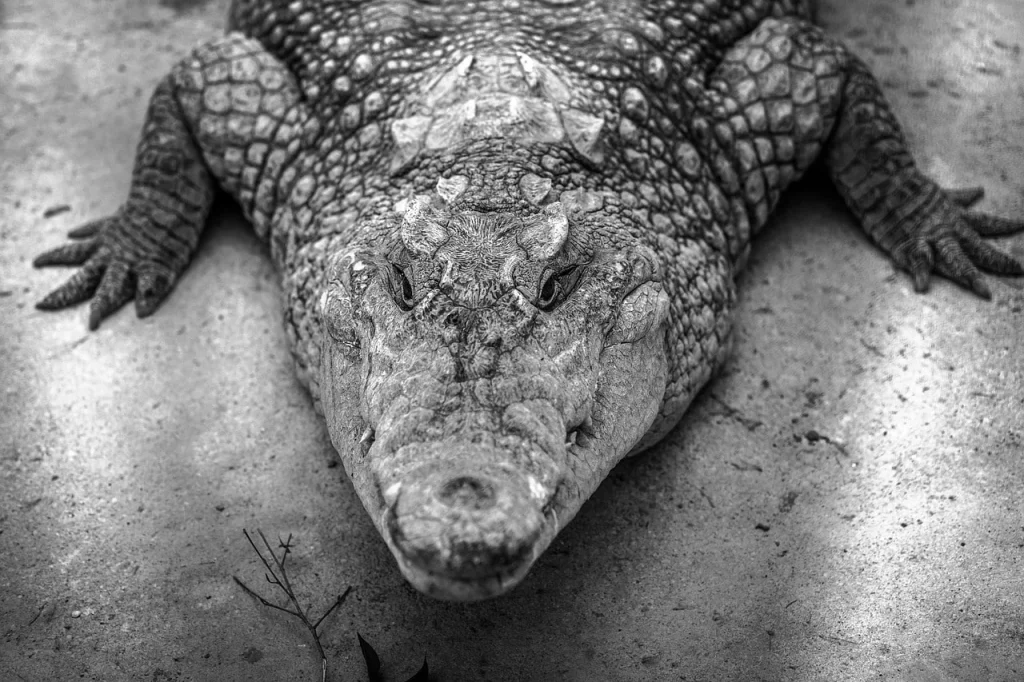Welcome to the wild world of alligators, where every fact is as jaw-dropping as their bite! Did you know that alligators have been around for millions of years, making them the unofficial senior citizens of the reptile world?
They’ve seen dinosaurs come and go, and yet they’re still here, probably wondering what all the fuss is about smartphones and the internet. These scaly survivors are fascinating creatures, with secrets hidden in their toothy grins.
But before we start, let me tell you something. Why do alligators never play cards? Because they’re always sitting on the riverbank! (Sorry) Now that we’ve got that out of the way, are you ready to snap up some amazing alligator facts?
Alligators are a mirror of our soul.
Luis Fernando Verissimo
Alligator Facts
Let’s start our journey into the fascinating world of alligators. I created a quiz at the end of this article to test how well you’ve absorbed these facts, so ensure you read each section with utmost attention to claim your expert status.
- Alligators belong to the family Alligatoridae.
- The American alligator is scientifically known as Alligator mississippiensis.
- Alligators have a powerful bite, but the muscles to open their jaws are relatively weak.
- An alligator’s brain weighs 8-9 grams and is the size of a walnut.
- Alligators can live up to 50 years in the wild.
- A group of alligators is known as a congregation.
- Alligators have between 74 and 80 teeth in their mouth at a time.
- They can go through 3,000 teeth in a lifetime.
- Alligators can use tools: they balance sticks on their heads to lure birds looking for nesting material.
- The Chinese alligator is critically endangered.
- Alligators have a powerful tail that helps them move swiftly in the water.
- Mother alligators make a nest of vegetation that heats up, helping to incubate the eggs.
- Alligators’ sex is determined by the temperature of the nest where the eggs are incubated.

- They can stay underwater for up to 24 hours if they are not active.
- Baby alligators communicate with their mothers through high-pitched yelps.
- Alligators have a specialized valve in their throat called a glottis that allows them to catch prey underwater without drowning.
- Their eyes glow red in the dark when light shines on them.
- Alligators can run up to 35 mph (56 km/h) on land for short distances.
- Alligators play a key role in their ecosystem by creating ‘gator holes’ that provide habitat for other wildlife.
- They have a special membrane that protects their eyes underwater.
- Alligators are ectothermic, regulating their body temperature through their environment.
- Alligators have a slower metabolism and can survive without food for up to 3 years.
- The largest alligator ever recorded was over 19 feet (5.8 meters) long.
- Alligators have a ‘third eyelid,’ a nictitating membrane that cleans and protects the eye.
- Alligators prefer fresh water but can tolerate salt water for short periods.
- They can hear underwater due to a special set of muscles that close off their ears.
- Alligators are apex predators, meaning they are at the top of the food chain.
- Alligators have been around for about 150 million years.

- Their stomachs have high levels of acidity, which can digest bones and shells.
- Young alligators eat small fish, insects, snails, and worms.
- Alligators sometimes perform a behavior called “bellowing” to communicate and establish territory.
- They can sense vibrations in the water through special organs called integumentary sensory organs.
- Alligators’ jaws can exert over 2,000 pounds of force per square inch.
- Alligators have a unique ability to regulate their body’s salt balance.
- Mating season for alligators is in late spring.
- Alligator farming is a significant industry in some U.S. states.
- Alligators have a unique upper eyelid that cleans and protects the eye.
- They can live in a variety of habitats, including marshes, swamps, rivers, and lakes.

- Baby alligators are typically 6 to 8 inches (15-20 cm) long when they hatch.
- Alligators are more active at night.
- They can climb fences and ladders.
- Alligator skin is used for high-quality leather products.
- Alligators help control the population of certain prey species.
- They have a slow growth rate; it can take 10-15 years for an alligator to reach maturity.
- Historically, alligators were hunted to near extinction for their hides and meat.
- Alligators have a unique vocalization called a “growl” that they use in various situations.
- Their immune system is very efficient, allowing them to survive injuries that would be fatal to other animals.
- Conservation efforts have been successful in increasing alligator populations in many areas.
- Alligators play an important role in folklore and mythology in various cultures.
- They can live in brackish water, a mix of salt and fresh water.
Alligator Myths

Having explored some interesting alligator facts, let’s now embark on a journey to unravel the truth behind the myths that often shroud these fascinating creatures.
- Alligators Can Run Faster than Humans on Land
While they can move quickly over short distances, they are not faster than humans on land. An average alligator’s top speed is about 11 mph, but only for a short burst. - Alligators Have Poor Eyesight
Contrary to this myth, alligators actually have very good eyesight, which helps them hunt at night. Their eyes are well-adapted to see in low light conditions. - Alligators Are Aggressive Toward Humans by Nature
They generally avoid human interaction unless provoked or if they associate humans with food (due to being fed). They are not naturally inclined to attack humans. - Alligators Can Live in Saltwater
While alligators can tolerate saltwater for short periods, they are primarily freshwater animals. Prolonged exposure to saltwater is not ideal for their health. - Alligators Continue Growing Throughout Their Lifetime
They do grow rapidly when they’re young, but this growth slows significantly as they age. They don’t grow continuously throughout their lives.
No products found.
Alligator Quotes

Alligators have long captivated our imaginations, lurking in the waters of the southern United States. Let’s dive into the depths of their world with these quotes.
Do not taunt the alligator until after you have crossed the creek.
Dan Rather
Esteemed journalist Dan Rather uses this metaphor to advise against prematurely celebrating or provoking a situation until one is safely through a challenging or risky phase.
An alligator is the original armoured vehicle.
Terri Irwin
Wildlife conservationist Terri Irwin draws an analogy between the tough, protective skin of an alligator and a military armoured vehicle, highlighting the alligator’s natural defenses.
The only thing worse than being blind is having sight but no vision.
Helen Keller
Although not directly about alligators, this profound quote by Helen Keller is often used in the context of conservation, emphasizing the importance of foresight and vision in protecting species like alligators.
The alligator comes from an ancient line, and he notices.
Mary Oliver
Celebrated poet Mary Oliver reflects on the alligator’s ancient lineage, suggesting a sense of wisdom and timelessness inherent in these creatures.
Never insult an alligator until after you have crossed the river.
Cordell Hull
Former U.S. Secretary of State Cordell Hull offers practical advice wrapped in metaphor, implying the importance of not antagonizing a potential threat until one is in a position of safety.
Alligator FAQ

After journeying through the captivating quotes about alligators, we’ve arrived at the final section before the quiz: the FAQs. Make sure to absorb every bit of information; it’s crucial for what’s ahead.
- Are Alligators Reptiles?
Alligators are reptiles. They belong to the order Crocodylia, which also includes crocodiles, caimans, and gharials. Reptiles are known for their scaly skin, and alligators are no exception, sporting a tough, protective exterior. - Which States Have Alligators?
Alligators primarily reside in the southeastern United States. You’ll find them in states like Florida and Louisiana, which have large alligator populations. They also live in Georgia, South Carolina, Alabama, Mississippi, Texas, Oklahoma, Arkansas, and North Carolina, but in smaller numbers. - Are Alligators Endangered?
The American alligator was once endangered but has made a remarkable recovery. Thanks to conservation efforts and protective regulations, they’re now listed as ‘Least Concern‘ by the IUCN. However, their cousin, the Chinese alligator, is critically endangered. - How Do Alligators Mate?
Alligator courtship is quite fascinating. It begins in the spring with males displaying to attract females through bellowing, slapping their snouts on the water, and emitting infrasound. After mating, the female builds a nest and lays eggs, which she guards diligently until they hatch. - Can Alligators Climb Trees?
Surprisingly, yes, alligators can climb trees! Although they’re not agile climbers, they’ve been spotted in low branches near water. They do this to bask in the sun and regulate their body temperature. However, don’t expect to see them scaling tall trees – they prefer to stay closer to the ground and water.
No products found.
Alligator Trivia

Welcome to the alligator quiz! Brace yourself, because if you don’t get these questions right, you might just find your bathtub mysteriously occupied tomorrow morning!
Conclusion
As we conclude our exploration of alligators, let’s appreciate these incredible animals for their unique role in nature. Their existence is a testament to the beauty and complexity of the animal kingdom.
But before we close, I have an important question for you. Have you ever wondered if alligators prefer their marshmallows toasted or untoasted during a campfire in the swamp? Let me know your opinion on this in the comments.
5 Sources Used For This ArticleWhat States Have Alligators? – Reptiles Blog
Alligators – 30 Amazing Facts, Info & Pictures – Exploration Junkie
Lifespan, longevity, and ageing – Eol
The Alligator – Members Tripod


